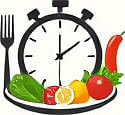Efficient Meal Planning for Busy Professionals
 by Verner Mayer
by Verner Mayer
Discover practical strategies to streamline your meal planning and save time in the kitchen. Learn simple techniques for preparing nutritious meals that fit into a hectic schedule, helping you maintain a balanced diet without extra effort.

Busy professionals often face the challenge of balancing work and healthy eating. Effective strategies can make a big difference in managing daily routines. For instance, starting with a weekly overview helps organize your meals ahead of time.
One key approach is batch cooking. This method involves preparing larger quantities of food at once. By focusing on batch cooking, you can create multiple servings that last through the week. This reduces the need for daily cooking sessions.
Another useful technique is using simple ingredient lists. Opt for versatile items like vegetables, grains, and proteins that can be mixed and matched. For example, pre-chopped vegetables save preparation time and add nutrition to various dishes.
Quick recipes play a vital role in this process. Consider options that take under 30 minutes, such as stir-fries or salads. A basic stir-fry might include lean protein and fresh veggies, cooked in one pan for ease.
To implement these ideas, begin by setting aside a specific time each week for planning. Create a list of meals that align with your schedule. This practice ensures you have ready-to-eat options available.
Essential Kitchen Hacks
In the kitchen, small changes lead to big savings in time. For starters, invest in tools like a good knife and storage containers. A sharp knife makes chopping faster and safer, while containers keep meals fresh.
Meal prep containers are particularly helpful. They allow you to portion out meals in advance, making it easy to grab and go. Use them to store pre-made lunches or dinners.
When selecting recipes, prioritize those with minimal steps. A simple salad can be assembled with pre-washed greens and a homemade dressing. This keeps things straightforward and nutritious.
Balancing flavors is important too. Aim for a mix of tastes in your meals to keep them enjoyable. For busy days, rely on quick recipes that use pantry staples like canned beans or frozen fruits.
Staying Motivated
Keeping up with these strategies requires consistency. Track your progress by noting what works best for you. Over time, you'll find that regular planning leads to better habits.
Remember, the goal is to make healthy eating sustainable. By incorporating these techniques, you can enjoy home-cooked meals without overwhelming your schedule. Start small and build from there, focusing on progress rather than perfection.
In practice, many find that preparing meals in advance reduces stress. For example, having breakfast options ready means one less decision in the morning. This approach supports overall well-being and energy levels.
Finally, experiment with variations to keep things interesting. Try different herbs or spices in your dishes to add variety. With these methods, maintaining a nutritious diet becomes a natural part of your routine.
